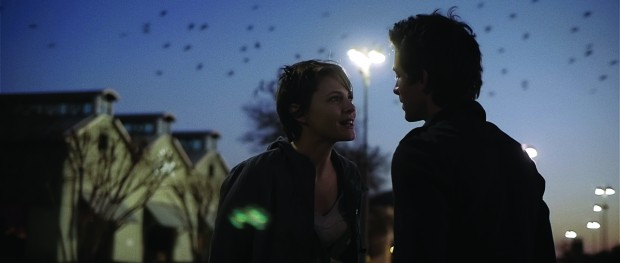With expectations mounting as the years ticked by, those that have witnessed the intricately detailed and mind-bending time-travel film Primer have been patiently waiting for Shane Carruth to deliver his follow-up. Now, nine years after his grand debut, his sophomore feature Upstream Color finally had its world premiere at Sundance Film Festival. Although this science-fiction-tinged romantic drama certainly comes from the same brain, it is an altogether different beast — visually expansive and poetic, one may (clearly intentionally) leave with more than a few questions, but there are overarching themes that aren’t strenuous to glean for those that give the film the attention it requires.
The fractured, hypnotic style is introduced in the initial moments, as mysterious plants are plucked, rooted in dirt filled with small worms. A mysterious man separates the living worms from the dead and the manner in which this act is conveyed is intriguing, but obtuse — something to prepare us for the next 90 minutes. The man abducts an unsuspecting woman, Kris (Amy Seimetz), forcing the worm inside her and seemingly hypnotizing his subject to sign over her entire savings. The parasite creature grows larger and larger, infesting her body, down her legs and through her arms. After a horrific, failed attempt to cut the worm out of her host body, Kris winds up at a sound-recording pig farmer’s estate and the parasite is transferred from her to a the body of a swine.

While this all sounds complicated on text, Carruth is able to effectively retain our attention amidst the multiple, occasionally aloof threads, adding another when he, also acting in the film, enters as Kris’ significant other. Shifting tones, the potential aftermath of Kris’ traumatic event continually percolates, delivering a romantic drama like no other. Even if I were to unveil what occurs past this first act, it wouldn’t produce any satisfying answers in this format, but that’s not to say Carruth isn’t interested in giving us a story without substance.
If anything is to be derived, Carruth is intrigued by the cyclical nature of life itself, using a woman, a pig, a plant and a parasite to explore this vast idea on a more intimate scale. While Primer’s central feat was its complicated, exhaustively comprehensive script, Upstream sees our director/writer/actor/producer/composer/cinematographer and specifically editor (co-edited alongside Ain’t Them Bodies Saints‘ David Lowery) take a considerable leap forward on the visual playing field, spatially jumping around, as dialogue will bleed into preceding shots and wonderfully composed, erratic scenarios are scattered amongst the tender romantic through-line.
There is a constant sense that all these elements will finally come together, and while Carruth never betrays his story with a final tell-all of sorts, the ending brings enough satisfaction on a character level, and certainly enough to discuss until a second viewing. Exploring how love can change two emotionally, physically damaged people, Upstream Color is a bold, dream-like whirlwind of an experience, one whose fleeting frustrations can be pardoned by its thoroughly captivating approach.


